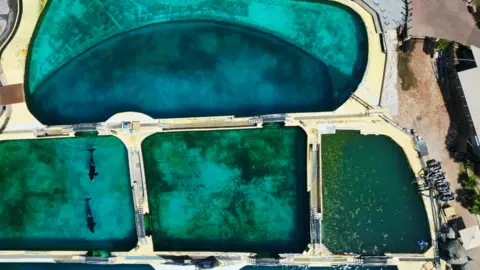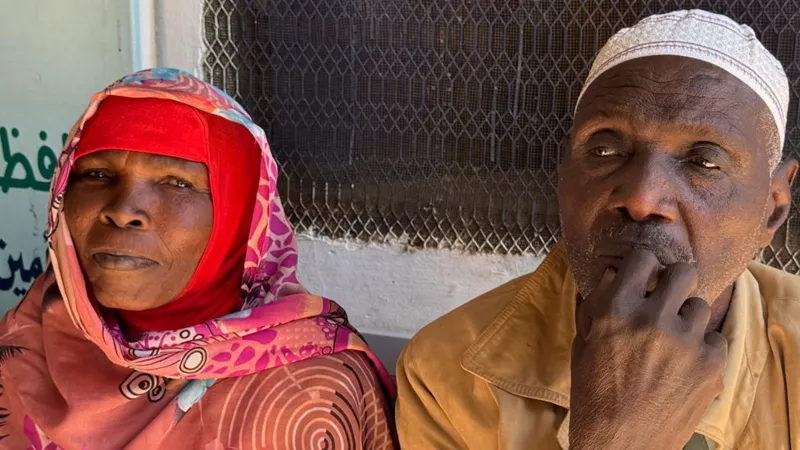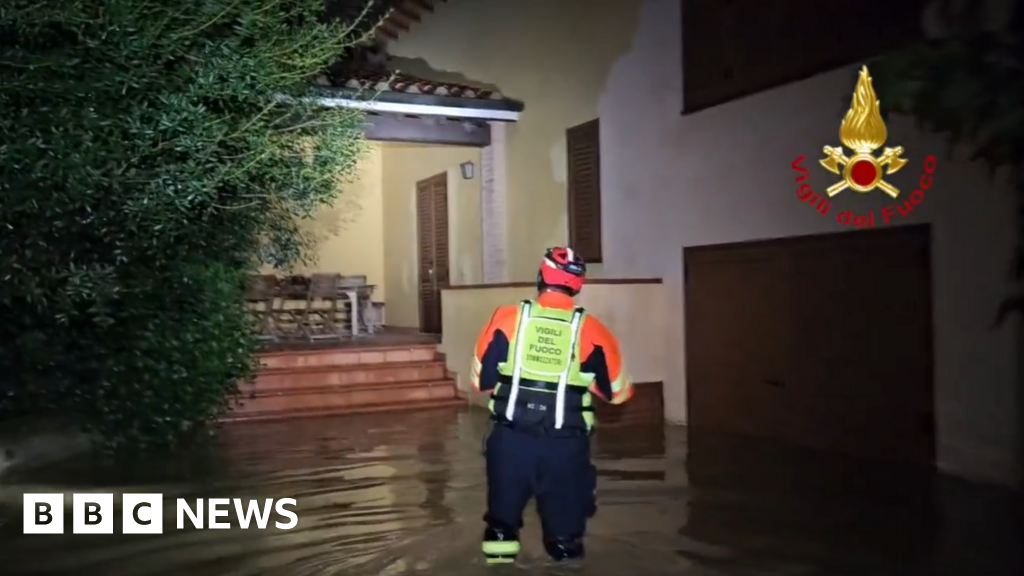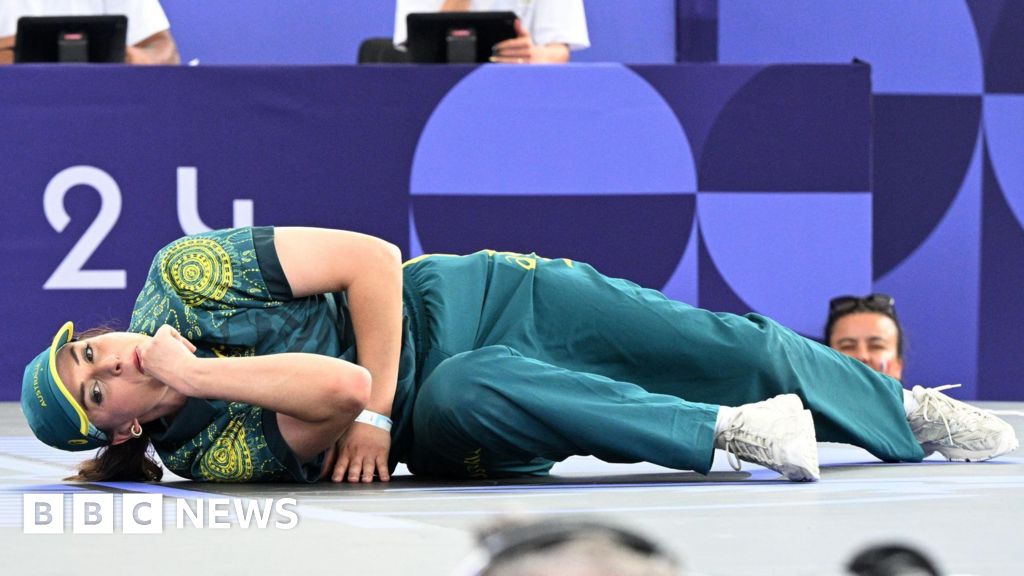BBC News
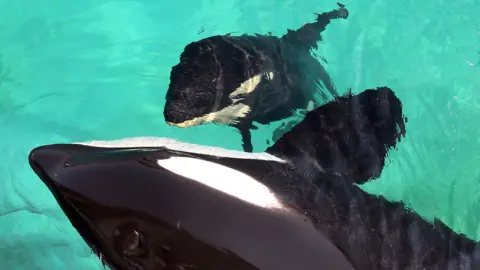 AFP
AFPA male killer whale at a closed marine zoo is being sexually stimulated by his trainers to stop him inbreeding with his mother.
Marineland Antibes shut in January but managers, the French government and animal rights activists have not agreed on where or how the orcas should be rehomed.
The closure comes ahead of a French law taking effect in December, which bans the use of whales in marine zoo shows.
The impasse means the pair – Wikie, 24, and her 11-year-old son Keijo – are still being kept in their pools and being cared for by their trainers at the facility in southern France.
Last week the activist group TideBreakers obtained overhead footage showing two trainers standing at the edge of a pool next to Keijo as he lies upside down.
One trainer holds on to a flipper as the other stimulates the whale, who can be seen writhing about in the water.
Wikie can be seen in an adjacent pool facing towards where her son is being held. Keeping them in separate pools permanently is considered harmful to their wellbeing as orcas are sociable animals.
The footage was taken on 12 August and managers at Marineland tell BBC News the action was necessary as Keijo is reaching adolescence and has increasingly strong sexual urges.
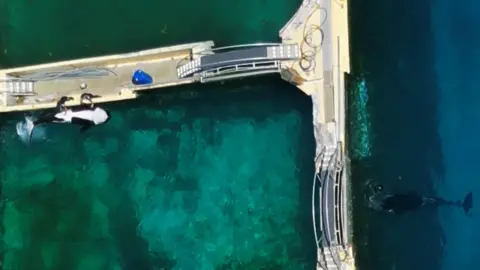 TideBreakers
TideBreakers“In order to avoid inbreeding with his mother, but also to prevent them from fighting and injuring each other, Marineland decided to sexually stimulate Keijo [to relieve him of his] tensions.”
Managers add: “Although spectacular, this is natural and totally painless for the animals.”
The French ecology ministry, which must approve where the orcas are rehomed, say they were informed by Marineland that Keijo is being stimulated once a month and that a veterinary expert has been consulted about the process.
Valerie Greene, a member of TideBreakers who worked at SeaWorld Orlando for a decade, tells us the stimulation of Keijo for sexual relief is unusual.
“As a former killer whale trainer, I’ve never seen this behaviour performed for anything other than attempting semen collection for use in artificial insemination.”
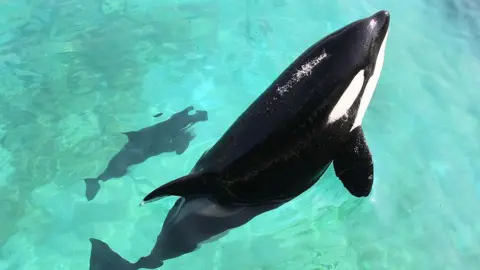 AFP
AFPFemale orcas kept captive in marine zoos can be artificially inseminated to breed more calves, which can later be used to attract more visitors and perform in shows.
This was quite common until the last decade when laws were passed in countries, including France and the US, banning several breeding practices.
However, breeding laws in Japan are less strict and activists believe marine zoo managers there may be interested in purchasing orca semen after the country’s only male orca, Earth, died on 3 August.
‘Perverse new low’
Just over a week after his death, Marineland’s trainers were seen stimulating Keijo.
Greene adds: “Keijo is inbred, so it’s even more concerning that his semen might be used for breeding of captive orcas.” Keijo’s mother and father are half-siblings.
Managers at Marineland deny this was why Keijo was stimulated. They add the sale of semen is prohibited and any export would need authorisation from the French government.
The French ecology ministry say Marineland have also told them there is no intention to collect and export orca semen for breeding purposes.
“Regardless of the reasoning, it’s sad that this is a priority when Keijo desperately needs to be rescued because his environment is unsafe,” says Greene.
“The notion that trainers are providing sexual relief to an orca… is a perverse new low in the captivity industry’s morally bankrupt practices.”
How did we get here?
- November 2024: Ecology minister Agnès Pannier-Runacher rejects an application from Marineland to move the orcas to a marine zoo in Japan.
- January 2025: Marineland Antibes holds its last show before closing down. Activist groups call for the orcas to be moved to a proposed whale sanctuary in Canada, but this is rejected by the ecology ministry.
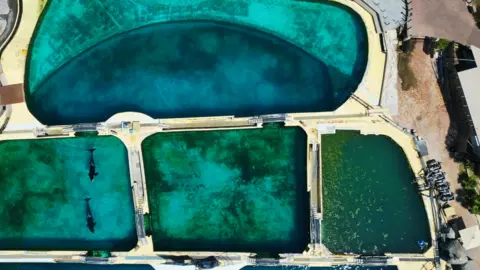 TideBreakers
TideBreakersSince then there have been no significant developments as to where the pair might end up and no European sanctuary site has been developed for them.
There have also been mounting concerns about the conditions at Marineland and whether it is safe for Wikie and Keijo to remain there.
Two weeks ago Pannier-Runacher released another Instagram video in which she tried to allay fears about the orcas’ welfare and said regular inspections of the pools were taking place.
Katheryn Wise, wildlife campaign manager at the charity World Animal Protection, who has been monitoring the situation, tells us: “It is fair to say that the passivity of the French government when it comes to enabling alternatives for these animals, and communicating with organisations involved in developing professional sanctuary alternatives, is insufficient and is leading to unnecessary delays [in rehoming them].”
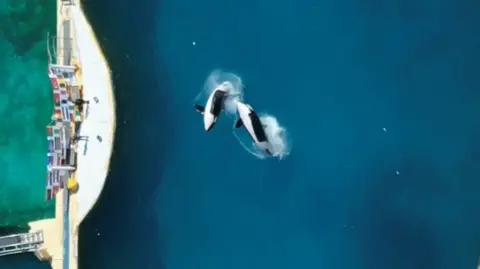 TideBreakers
TideBreakersRehoming animals after the closure of a zoo is often difficult, particularly for larger animals which require bigger facilities and higher levels of care.
When Living Coasts, a marine zoo in Devon, announced its closure in 2020, managers warned they might have to euthanise animals for whom they could not find new homes. Eventually places were found for all of them.
After Orsa Predator Park in Sweden shut in 2022, some of their polar bears did not find new homes until the following year. Two of the bears were transported to Suffolk but one died shortly after arriving.
Following a request by a French court, an expert assessment is being carried out of Marineland’s facilities and whether the orcas, and a dozen dolphins also still housed there, should be moved.
The French ecology ministry told us: “A task force set up by the ministry is working, under the aegis of the environment ambassador Barbara Pompili, to define a coordinated strategy at the European level for the care of orcas and dolphins, particularly those at Marineland.”
For Marketa Schusterova, a videographer who co-founded TideBreakers, the situation for Wikie and Keijo is bleak.
She says: “We have been advocating for a temporary tank to be built and expedited until a sanctuary is ready, but we’re worried that we are past that point. Time is running out.”
